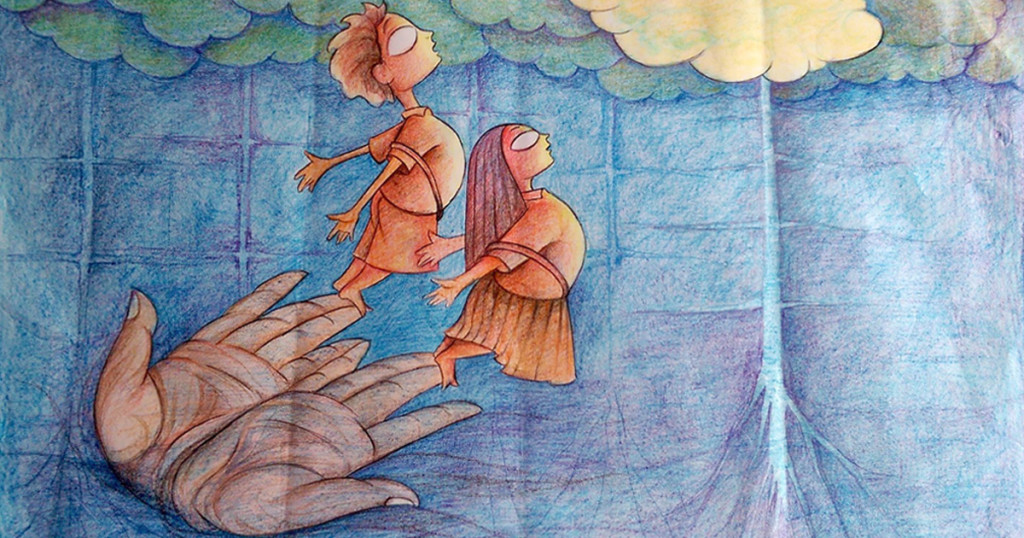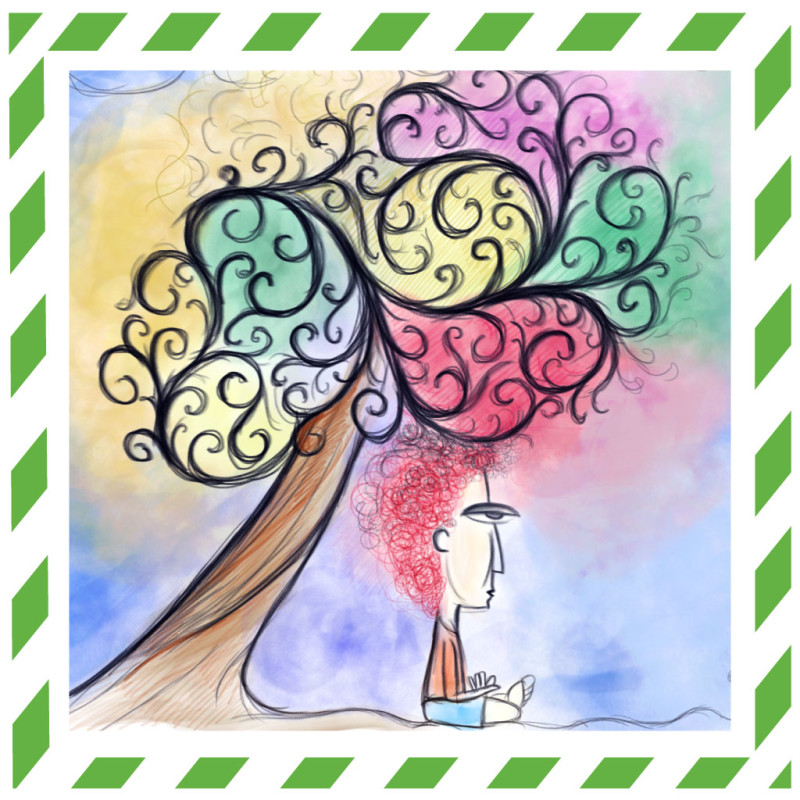Reinforce in his or her mind a positive thought and confidence about his own qualities.


Reinforce in his or her mind a positive thought and confidence about his own qualities.

It is said that fostering creativity helps a person to develop mentally, socially, and emotionally. Creating art may boost people’s ability to analyze and problem-solve in myriad ways. Art relates to creative thinking, broadening the mind and feeding the soul: all of which address the common fears that any person may experience in the day to day life
Art makes us more humane: it helps us to communicate in a different personal language.
Art is a form of therapy.
Working in a non-competitive, relaxed environment, any form of art will enable a person to come closer to greater personal achievements by strengthening his or her individuality and self esteem.
But apart from all these valid reasons, here in this Art class Art is taught for Art’s sake. The most important reason why a person should learn art is because it gives pleasure, being able to do want one wants provides great satisfaction.
We offer Classes in different drawing styles, Sketching, Doodling, Painting and colouring with different mediums and advanced design classes digital drawings and applications.

Parenting a teenager is never easy. But we as parents should find steps that can significantly reduce the chaos at home and help our teens’ transition into a happier, more successful young adult.
As teenagers begin to assert their independence and find their own identity, many experience behavioral changes that can seem bizarre and unpredictable to parents. Your sweet, obedient child who once couldn’t bear to be separated from you now won’t be seen within 20 metres of you, and greets everything you say with a roll of the eyes or the slam of a door. These, unfortunately, are the actions of a normal teenager.
Keeping up with fashion is important to teens. That may mean wearing provocative or attention-seeking clothing or dyeing hair. Unless your teen wants tattoos, avoid criticizing and save your protests for the bigger issues. Fashions change, and so will your teen
As teens begin seeking independence, you will frequently butt heads and argue.
Hormones and developmental changes often mean that your teen will experience mood swings, irritable behavior, and struggle to manage his or her emotions.
Friends become extremely important to teens and can have a great influence on their choices. As teens focus more on their peers, that inevitably means they withdraw from you. It may leave you feeling hurt, but it doesn’t mean your teen doesn’t still need your love
A teenager’s brain is still actively developing, processing information differently than a mature adult’s brain. The frontal cortex—the part of the brain used to manage emotions, make decisions, reason, and control inhibitions—is restructured during the teenage years while the whole brain does not reach full maturity until about the mid-20’s
Your teen may be taller than you and seem mature in some respects, but often he or she is simply unable to think things through at an adult level. Hormones produced during the physical changes of adolescence can further complicate things. Now, these biological differences don’t excuse teens’ poor behavior or absolve them from accountability for their actions, but they may help explain why teens behave so impulsively or frustrate parents and teachers with their poor decisions, social anxiety, and rebelliousness. Understanding adolescent development can help you find ways to stay connected to your teen and overcome problems together.
It may seem hard to believe—given your child’s anger or indifference towards you—but teens still crave love, approval, and acceptance from their parents. Positive face-to-face connection is the quickest most efficient way to reduce stress by calming and focusing the nervous system. That means you probably have a lot more influence over your teen than you think. Just open the lines of communication:
Be aware of your own stress levels. If you’re angry or upset, now is not the time to try to communicate with your teen. Wait until you’re calm and energized before starting a conversation. You’re likely to need all the patience and positive energy you can muster.
Be there for your teen. An offer to chat with your teen over coffee will probably be greeted with a sarcastic put-down or dismissive gesture, but it’s important to show you’re available. Insist on sitting down for mealtimes together with no TV or other distractions. Look at your teen when you speak and invite your teen to look at you. Don’t get frustrated if your efforts are greeted by nothing more than monosyllabic grunts or shrugs; you may have to eat a lot of dinners in silence, but when your teen does want to open up, he or she will have the opportunity to do so.
Find common ground. Trying to discuss your teen’s appearance or clothes may be a sure-fire way to trigger a heated argument, but you can still find some areas of common ground. Fathers and sons often connect over sports; mothers and daughters over gossip or movies. The objective is not to be your teen’s best friend, but to find common interests that you can discuss peacefully. Once you’re talking, your teen may feel more comfortable opening up to you about other things.
Listen without judging or giving advice. When your teen does talk to you, it’s important that you listen without judging, mocking, interrupting, criticizing, or offering advice. Your teen wants to feel understood and valued by you, so maintain eye contact and keep your focus on your child, even when he or she is not looking at you. If you’re checking your email or reading the newspaper, your teen will feel that he or she is not important to you.
Expect rejection. Your attempts to connect with your teen may often be met with anger, irritation, or other negative reactions. Stay relaxed and allow your teen space to cool off. Try again later when you’re both calm. Successfully connecting to your teen will take time and effort. Don’t be put off; persevere and the breakthrough will come.
Ensure your teen gets enough sleep. Sleep deprivation can make a teen stressed, moody, irritable, and lethargic, and cause problems with weight, memory, concentration, decision-making, and immunity from illness. You might be able to get by on six hours a night and still function at work, but your teen needs 8.5 to 10 hours of sleep a night to be mentally sharp and emotionally balanced person. Encourage your teen to sleep properly by setting consistent bedtimes, and removing TVs, computers, and other electronic gadgets from your teen’s room—the light from these suppresses melatonin production and stimulates the mind, rather than relaxing it. Suggest your teen tries listening to music or audio books at bedtime instead
It’s worth reminding your teen that no matter how much pain or turmoil he or she is experiencing right now, with your love and support when it’s needed, things can and will get better—for both of you. Your teen can overcome the problems of adolescence and mature into a happy, successful young adult.

This is the true prayer—the seeker’s admission of his sense of limitedness and his heartfelt cry for assistance in transcendence. It is not a prayer for the things of the world. It is not a pray for food, shelter, health, partnership, riches, success, fame, glory or even for heaven. One who recites this mantra should realize that such things are full of holes, soaked in pain and, even in abundance, will forever leave him wanting. It should be in this full understanding that one should turn to this prayer.
The essence of each of this mantra is: “O, Guru, help me free myself from my sundry misunderstandings regarding myself, the universe and God and bless me with true knowledge.
Now what exactly is true knowledge?
Tamaso ma jyotirgamaya—means “Lead me from darkness to light.” When the Vedas refer to darkness and light, they mean ignorance and knowledge, respectfully.
This is so because ignorance, like darkness, obscures true understanding. And in the same way that the only remedy for darkness is light, the only remedy for ignorance is knowledge. The knowledge spoken of here is again the knowledge of one’s true nature. I think the ultimate knowledge is the knowledge of oneself, the true knowledge of oneself with one’s surroundings, one’s knowledge from one’s own true and unprejudiced observations etc. The first step towards knowkedge is the understanding that Knowledge is different from Information.
As we are transitioning from the information age to the knowledge age, we also have to start thinking about the transition in to knowledge age and ask ourselves” Where is the knowledge we have lost in information?”
Difference between Knowledge and Information
The human mind’s content is based on the kinds of things that one interacts with on a daily basis. Many a time people perceive things based on either what they have seen, experienced, heard, read, learned or inferred after some experimentation.
These perceptions are then categorized in the mind as data, information, knowledge, understanding or wisdom. Unlike wisdom information is as a result of what the brain has recorded in the past.
.All perceived knowledge or information derives from human experience and/or human reason. We may attempt to accumulate this perceived knowledge or information through pragmatism, coherence, correspondence, etc, but absolute knowledge can never be attained with this tools. We, as humans find it difficult to distinguish our perceived knowledge from absolute knowledge. Our knowledge fails to transcend into the realm of the absolute. Because information we acquire is relative and often conditional, it can not exceed mere conjecture.
Information being practical knowledge is relative and not absolute.
True knowledge is not relative and is absolute.
Information of course is needed for our day to day existence and for exist in this practical world. But we should build up our information on the strong foundation of true knowledge. Without that strong foundation our construction of information can be shaky which will again lead to prejudices and preconceived notions. These
prejudices and notions need not be absolutely true. In my opinion this will make the world a pandemonium of evils the fruits of which we are already bearing.
But the strength of the strong knowledge as the foundation for information will help us to create a generation of optimistic, practical, enthusiastic to face the life individuals who can call a spade a spade. Knowledge reflects the understanding of Universal Truths or basic laws or patterns. Knowledge is based on values, meaning systems and understanding unpredictability and uncertainty are parts of life. This knowledge itself can strengthen the minds of our youngsters and which inturn will bring down the rate of suicides and terroristic attitudes injected in them through the injection of wrong information from their surroundings.
Anuradha nayar

Since its inception in 1999, Ashraya has been relentless in the pursuit of welfare of specially gifted girl children. The organisation has been instrumental in rehabilitating empowering and educating these children. This “Innovative Conceptualization of Ideas in Social work” award has been presented to Mr Venugopalan Nair and the entire team at Ashraya, honouring their efforts for the cause. Jyothirgamaya salutes the endeavour and spirit of everyone associated wth Ashraya.
“Look at the sky. We are not alone. The whole universe is friendly to us and conspires only to give the best to those who dream and work.”
Dr APJ Abdul Kalam
 Dear Sir,
Dear Sir,
Now we Indians are confident about atleast one bright star, when we look up, the brightest of all, which will never fail us. The one star which will conspire with all the powers of universe to fulfil the wishes of all those who dream and work, the one star which will always inspire us to dream, the one star which will inspire us to follow our dreams, the one star which will always be our confidence, the one star which will guide us along the dark orbits of this universe.
Dear Sir, never cease to be our inspiration, never cease to be the fountain of our confidence, never cease to be the master who taught us to dream… dream for our life, dream for our country, dream for our dear ones, dream for ourselves.
Oh our master dreamer… it is with a whimpering heart that we realise that today is the last day we can physically spend with you but we are quite confident that where ever you are your thoughts, your emotions and your intellect will always be eagerly hovering over us, correcting us, guiding us and as always dreaming about us. We know sir that we are not alone.
Adieu, our Grand Master
Anuradha Nayar